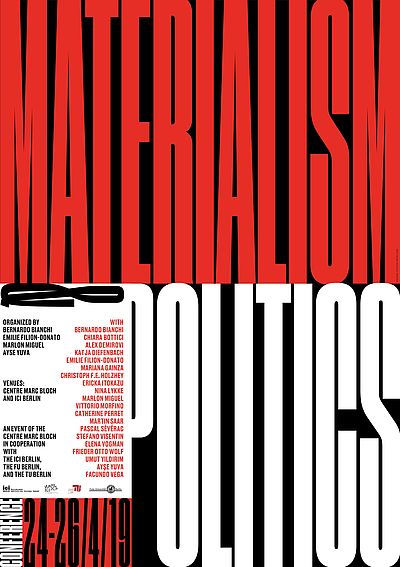Materialism and Politics
April 24 | 14:00
Kritisches Denken im Plural. Begriffliche Wege der Sozialforschung
What is the relevance of materialism for thinking the political? Throughout modernity, materialism has been associated with fatalism, naturalism, heresy, and linked to radical ideas such as republicanism and democracy.
Despite never having claimed to be a materialist himself, Spinoza early on became associated with materialism, and the highly controversial, even condemned and censored central tenets of his philosophy came to be seen as evidence of a clandestinely held materialism, making Spinoza an emblem of the subversive alliance between materialism and democracy.
The revolutionary effects of eighteenth-century French materialism have been widely discussed since the French Revolution and throughout the nineteenth century. The works of Marx and Engels further aligned materialism withprogressive politics, anchoring political liberation in concrete social practices. Asmaterialist politics rejects the concept of the subject as a point of departure for social analysis, it draws onthe very materiality of social relationsin order to reflect on collective reality.If humankind is the product of socio-historical circumstances, the political task, for Marx, became one ofinquiring into and transforming its environment.
The past decades have revived the attention given to materialism and its affiliation with a progressive agenda. At the same time, neoliberalism emerges and poses a challenge to the foundations of citizenship as it expands its control over the materiality of social reproduction, the materialities underlying the reproduction processes of capitalist domination. Neoliberalism actively shapes society and strengthens social logics of exclusion in order to create a growing number of ‘sub-citizens’ or even ‘non-citizens’ subjected to new and more aggressive forms of exploitation and dispossession. To what extent can materialism counteract this neoliberal turn, and what are the available resources for a renewal of radical materialism that can energize the contemporary progressive agenda?
In English
With
Chiara Bottici
Alex Demirović
Katja Diefenbach
Mariana Gainza
Ericka Itokazu
Nina Lykke
Umut Yıldırım
Facundo Vega
et al
Organized by
Bernardo Bianchi, Émilie Filion-Donato, Marlon Miguel, and Ayse Yuva. An event of the Centre Marc Bloch in cooperation with the ICI Berlin, the FU Berlin, and the TU Berlin
Venues
24 – 25 Apr 2019
Centre Marc Bloch
Friedrichstraße 191, 10117 Berlin
7th floor, Germaine-Tillion-Saal
26 Apr 2019
ICI Berlin
The event, like all events at the ICI Berlin, is open to the public, free of charge. The audience is presumed to consent to a possible recording on the part of the ICI Berlin.
Contact
Ayse Yuva
yuva ( at ) cmb.hu-berlin.de
Partners
ICI Berlin, FU Berlin, TU Berlin
Program
Wednesday April 24, 2019 (CMB, 7th floor, Germaine-Tillion-Saal) | ||
2:00 pm - 3:00 pm | Greetings and general introduction | |
3:00 pm - 5:00 pm Modern Materialism
| Ericka Itokazu: Temporality and History in Spinoza: the Refusal of the Teleological Thought Stefano Visentin: Freedom and Necessity in Spinoza's Democratic Theory Ayşe Yuva: The history of philosophy and its materialistic criticisms in the 19th century: L. Feuerbach, L. Büchner and B. Fuad
Responder: Antonios Kalatzis | |
Coffee Break: 5:00 pm - 5:30 pm | ||
5:30 pm - 7:00 pm With Spinoza, beyond Spinoza
| Mariana Gainza: Materialist Variations around Spinoza. Theoretical Alliances and Political Strategies Vittorio Morfino: One or Two Aleatory Materialisms?
Responder: Oliver Precht | |
7:00 pm - Reception | ||
Thursday April 25, 2019 (CMB, 7th floor, Germaine-Tillion-Saal) | ||
10:00 am - 12:00 pm Materialistic Education
| Pascal Sévérac: A Materialistic Education : Spinoza with Vygotsky Bernardo Bianchi: Materialism in the Age of Affects: Populism and Political Education Marlon Miguel: The place of circumstances: for a materialistic and situated pedagogy
Responder: Bruno Pace | |
12:00 - 2: 00 pm - Lunch Break | ||
2: 00 pm - 4:00 pm Critical Materialities
| Umut Yildirim: The unexpected encounter of a Middle Eastern eco-system with some South American ethnographies Elena Vogman: Nikolai Marr and the Archeology of Time Catherine Perret: New critical perspectives based on André Leroi-Gourhan
Responder: Marlene Kienberger
| |
Coffee Break: 5:00 pm - 5:30 pm | ||
5:00 pm - 7:30 pm Materialism and Feminism | Nina Lykke: What can dead human bodies do? Chiara Bottici: Anarchofeminism and the ontology of the transindividual Émilie Filion-Donato : “Psychodynamism of Individuation and New Materialism: Possible Encounters”
Responder: Alison Sperling
| |
Friday April 26, 2019 - ICI Berlin | ||
2:00 pm - 4:00 pm New and Speculative Materialism | Katja Diefenbach: Between Two Structuralisms Christoph Holzhey: “Emergence That Matters and Emergent Irrelevance: On the Political Use of Fundamental Physics“ Frieder Otto Wolf: Materialism: Emergency and Politics
Responder: Daniel Liu | |
Coffee Break: 4:00 pm - 4:30 pm | ||
4:30 pm - 6:30 pm Politics and Materialities | Alex Demirovic: TBA Martin Saar: Critical Theory after the Ontological Turn Facundo Vega/ Emilio de Ípola: On Populist Illusion: The Leader, the People, and the Impasses of Hegemony
Responder: Katia Genel | |
| Coffee Break: 6:30 pm - 7:00 pm | ||
7:00 pm- 8:00 pm - Final discussion | ||
8:00 pm - Final Cocktail | ||
Location
Germaine-Tillion-SaalCentre Marc Bloch
Friedrichstrasse 191
10117 Berlin
